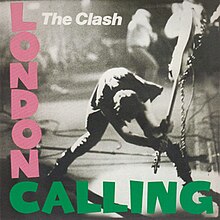The Vanilla Tapes
| London Calling | ||||
|---|---|---|---|---|
 |
||||
| Studio album by The Clash | ||||
| Released | 14 December 1979 | |||
| Recorded | August–September and November 1979 | |||
| Studio | Wessex Sound Studios in London | |||
| Genre | Post-punk | |||
| Length | 65:07 | |||
| Label | CBS, Epic | |||
| Producer | Guy Stevens, Mick Jones | |||
| The Clash chronology | ||||
|
||||
| Singles from London Calling | ||||
|
||||
| Professional ratings | |
|---|---|
| Retrospective reviews | |
| Review scores | |
| Source | Rating |
| AllMusic | |
| Blender | |
| Chicago Sun-Times | |
| Christgau's Record Guide | A+ |
| Down Beat | |
| Encyclopedia of Popular Music | |
| Q | |
| The Rolling Stone Album Guide | |
| Select | 5/5 |
| Spin Alternative Record Guide | 7/10 |
London Calling is the third studio album by English punk rock band the Clash. It was released as a double album in the United Kingdom on 14 December 1979 by CBS Records, and in the United States in January 1980 by Epic Records.London Calling is an album that incorporates a range of styles, including punk, reggae, rockabilly, ska, New Orleans R&B, pop, lounge jazz, and hard rock.
The album's subject matter included social displacement, unemployment, racial conflict, drug use, and the responsibilities of adulthood. While working on "The Card Cheat", the band recorded each part twice to create a "sound as big as possible". "Lover's Rock" advocates safe sex and planning. The final track, "Train in Vain", was originally excluded from the back cover's track listing. It was intended to be given away through a promotion with NME, but was added to the album at the last minute after the deal fell through.
The album received widespread acclaim and was ranked at number eight on Rolling Stone's list of The 500 Greatest Albums of All Time in 2003.London Calling was a top ten album in the UK, and its lead single "London Calling" was a top 20 single. It has sold over five million copies worldwide, and was certified platinum in the United States.
After recording their second studio album Give 'Em Enough Rope (1978), the band separated from their manager Bernard Rhodes. This separation meant that the group had to leave their rehearsal studio in Camden Town and find another location to compose their music. Tour manager Johnny Green and drum roadie Baker had found the group a new place to rehearse called Vanilla Studios, which was located in the back of a garage in Pimlico.
...
Wikipedia
